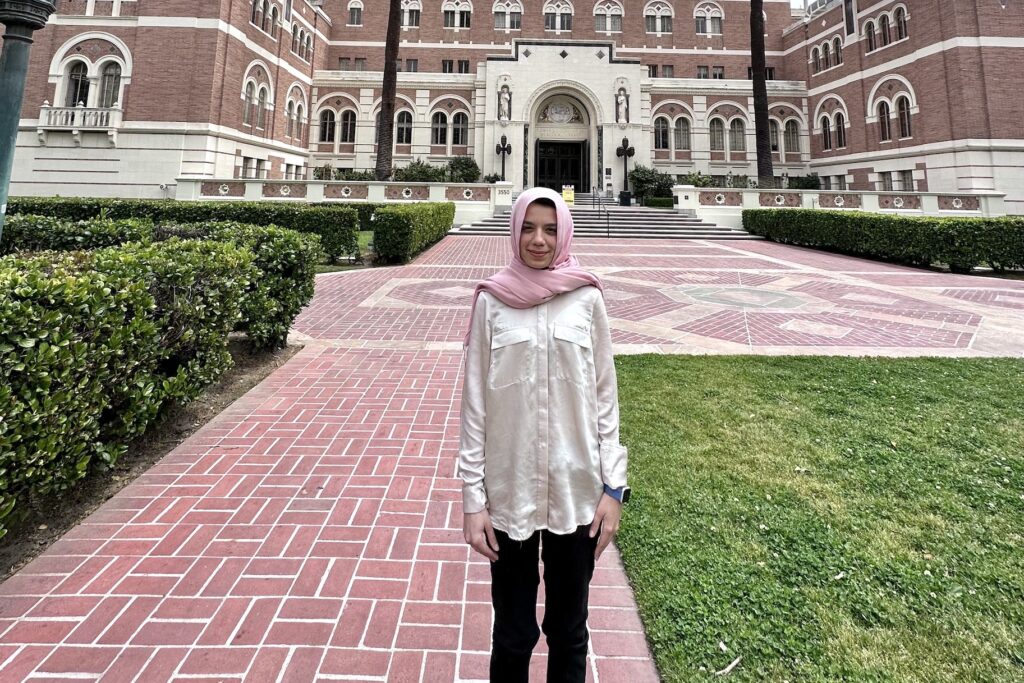Khoban Nasim never got to know her father. He was murdered in Pakistan while providing preventive medical services in the war-torn country.
“It happened in 1989,” said Nasim, who was born after his death. But his selfless humanitarian work as a pediatrician working with nongovernmental organizations inspired her to go into the medical field and philanthropic work.
“Connecting with my dad is a big part of why I pursue this work,” she said.
So, after working in medical research and development and as a clinical trials coordinator, Nasim decided to enter the Master of Public Health (MPH) program at the Keck School of Medicine of USC.
“The head of the biotech company where I worked was explaining what you can accomplish with an MPH, and that got me interested,” Nasim recalled. “I picked USC because I’m really drawn to global health, and the university has one of the top rankings for that field.”
Available online, the MPH offers a variety of concentrations, including community health promotion, biostatics-epidemiology, and health services and policy, in addition to global health. The program also features faculty members who bring a wealth of practical expertise to the theories and techniques they teach.
“The professors have a lot of experience working outside the United States, and that’s what I wanted in a program,” she noted.
Nasim speaks as someone who developed international experience just by growing up. Born in Pakistan, she spent much of her youth in Afghanistan before moving to the U.S. Coming of age in different parts of the world provides “a unique experience,” she said. “You have to learn the languages and the cultures just so you can adapt.”
In addition to the rest of her experiences, the MPH taught Nasim something she had not realized about the nations where she spent her formative years: “Pakistan and Afghanistan are the only countries where polio is endemic,” she said.
Awareness of the health care challenges faced by those countries and others led Nasim to create Project Yaqeen, a nonprofit organization committed to international humanitarian endeavors.
“Yaqeen translates to ‘certainty,’” she said of the Arabic term, which definitely applies to her devotion to enhancing lives.
The enterprise began by trying to save just one life: “It was a malnourishment case, and I was trying to get funding for baby formula,” Nasim recalled. “We had a baby formula shortage in the U.S., so you can just imagine how bad the situation is in poor countries.” The little girl, who weighed only 2.5 pounds, ultimately passed away. But Nasim’s humanitarian resolve only became more certain.
Project Yaqeen has since grown to help feed nearly 3,000 people in one year alone. In addition to aid provided to Afghanistan and Pakistan, Nasim has also worked with people from around the world to raise resources for those affected by the devastating 2023 Turkey–Syria earthquake.
“I just want to help however I can and with whatever connections I have,” she said.
Those connections now include her MPH professors and fellow scholars.
“I enjoy being part of a close cohort of students who are all passionate about health, science and humanitarian work, but who also come from different backgrounds and perspectives,” Nasim said.
While impressed by all the program’s offerings, she found the course “Overcoming Real World Challenges in Global Health” and the mentorship of its instructor, Mellissa Withers, to be especially impactful.
“I’m very thankful for Dr. Withers,” Nasim said. “She has been a great support throughout the program.”
Another key mentor is Heather Wipfli, who directs the USC Global Research, Implementation and Training Lab and is overseeing Nasim’s practicum. Part of her global health concentration includes 260 hours in a practicum, and Professor Wipfli has conducted much of her own work Uganda and Kenya.
Nasim is assisting Wipfli on a photovoice project aimed at preventing drownings in Uganda. Nearly 1,200 Ugandans die from drowning each year, although the nation’s outmoded record keeping makes accurate statistics hard to track.
“Uganda is surrounded by a lot of lakes and rivers, and the project is happening at 20 different sites,” Nasim noted.
Photovoice uses the universal language of photography to bridge linguistic and cultural divides in fomenting positive change. Since it is a relatively new research methodology, Nasim has appreciated the opportunity to learn about the technique that can build an understanding of “the different types of health-related problems in other parts of the world.”
As children face the highest risk of drowning, according to the World Health Organization, the practicum also speaks to Nasim’s dedication to helping young people.
“One of my biggest concerns is the infant mortality rate,” she said. “It’s a huge problem — especially in lower-income countries.”
After earning her MPH, Nasim plans to attend medical school and become a physician. While she always held the desire to enter the world of medicine, “learning at USC that I could make a difference in global health was definitely a happy surprise.”
As she continues striving to save and enhance lives, Nasim said she will be guided not just by the knowledge developed through the MPH program, but also by how her faculty inspired her.
“It’s like I heard Dr. Withers say,” Nasim recalled: “It would be a shame if we didn’t use the resources and connections that we have to help people” — including those we may never meet.
Learn more about the Master of Public Health (MPH) online program today.


